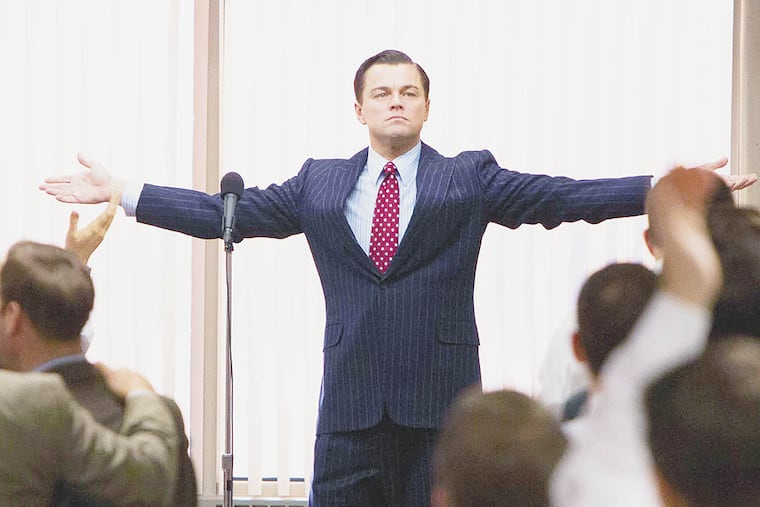'Wolf' a howl, but not much bite
Martin Scorsese turns stock scamming into a very raunchy, very long comedy in "Wolf of Wall Street," starring Leonardo DiCaprio.

THE BUCKET-SHOP swindler whose story is told in "The Wolf of Wall Street" is now a "motivational" speaker, but he's got nothing on Martin Scorsese.
Though conceived as a put-down of Wall Street excess, Scorsese's new movie is almost certain to recruit new blood to our ongoing bull-market bender.
I'm not sure what the director had in mind, but his images send a definitive message: If you are possessed of ambition, drive and moral flexibility, you too can have Lamborghinis and yachts and snort cocaine from the bums of hookers (the first thing you see in the prologue, so don't say you weren't warned).
Scorsese should have sought the counsel of Oliver Stone, who now ruefully concedes that his Gordon Gekko "Greed is good" speech in "Wall Street" brought more eager brains to high finance than any MBA program in the country.
And in "Wolf," greed isn't merely good.
It's freaking awesome.
Jordan Belfort (Leonardo DiCaprio) is a go-getter who gets bounced form his white-shoe trading job during the '87 crash. But he retains the stock-churning ethos he learns from his mentor (Matthew McConaughey, in a cameo), takes a job with a pink-sheet hustler (Spike Jonze!), immediately shows himself to be a master slinger of BS (a great scene) and sets up his own shop.
Belfort recruits mostly drug pushers to push his new enterprise, but will take anyone with chutzpah - one is a former salesman played by Jonah Hill, who dons lavender suspenders and becomes Belfort's colorful sideman, Pesci to DiCaprio's De Niro.
Their stock-slinging success is immediate and massive, and expresses itself with gaudy displays of debauchery - dwarves are tossed, hookers ravaged, drugs are consumed. Rob Reiner is Belfort's dad and horrified office manager.
The movie streaks like a comic meteor to this point. But it's right about here that its ideas start to rewind and repeat - a movie about the wages of sin becomes a spectacle about wages and sin.
We get a treatise on how they spend it (a golden calf spectacle worthy of De Mille), how they hide it (Swiss banks, courtesy of Jean Dujardin and Joanna Lumley, in an amusing role).
And how they are distorted by it. The point is made: These guys love drugs, money is the most powerful drug of all and addiction takes over their lives.
They get sick, their behavior gets sickening - servants are beaten, yachts are crashed and, as Belfort finally loses control, an FBI man (Kyle Chandler) closes in (shades of Henry Hill's coke-binge death spiral in "Goodfellas").
The high/low point is Belfort's quaalude overdose, affording DiCaprio (very game throughout) a chance to do a loose-limbed Jim Carrey slapstick, attempting to drag his useless muscles into his sports car.
We are, after three hours, finally near the end. Belfort raises his hand to his wife, puts his child in danger - and this is meant to be horrifying, but does little to rebalance the movie's comic fascination with gaudy privilege.
The movie's title and extreme running time suggests that Scorsese has something important to say about newfangled capitalism. And it's worth sticking around for the final lines, underlining Belfort's tennis match in a posh prison.
But - unforgiveably - Belfort's victims are never seen. The movie doesn't merely show us his bubble of wealth, it lives inside it.
And I had a hard time seeing Belfort as an example of anything other than Belfort. Pump-and-dump bottom feeders like Belfort are a dime a dozen in the investment business, as are Ponzi scammers like Bernie Madoff and money-crazed traders who love coke and pole dancers and bottle service.
Belfort, for all his personal wealth, was a fringe player. He was in jail long before the economy collapsed.
And that collapse wasn't brought about by some lone-wolf scammer. The economy was laid low by the biggest and most venerable names on Wall Street, by entire systems built on rotten risk models and pointless synthetic investments and cockamamy theories about endlessly efficient markets.
Put forth by the smartest, most acclaimed people in finance.
Greed, one may argue, is good, but stupidity is not, certainly not when 12 million jobs are on the line.